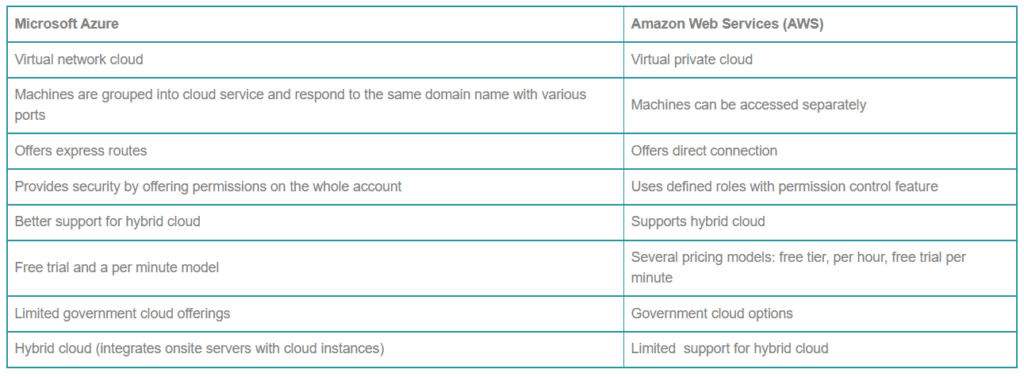Comparing AWS and Azure Cloud Services

When it comes to cloud services, Azure, developed by Microsoft, and Amazon Web Services (AWS), are two prominent players in the market. Both Azure and AWS offer comprehensive cloud architectures to build, run and manage applications across multiple clouds. Which should you use?
Let’s explore the pros and cons of Azure and AWS to empower you to make an informed decision about which cloud service is best suited for your specific business needs.
What Are Azure and AWS?
Azure and AWS are robust cloud architecture platforms that provide a wide range of tools and frameworks to support application development and management. Both platforms offer more than 200 products and services, ensuring versatility and flexibility in meeting diverse business requirements.
Azure (2010) entered the market later than AWS (2006) but has gained considerable traction over the years. Today, experts consider Azure superior in many aspects, thanks to continuous improvements and advancements.
6 Factors to Consider When Comparing Azure and AWS
To determine the right cloud service for your business, consider the following factors:
- The cost of cloud services: Assess the cost structure of each platform and evaluate which aligns with your budgetary requirements
- Amount of storage: Examine the storage solutions provided by each platform and determine which suits your data storage needs
- Hybrid cloud support: Determine whether the platform offers seamless integration between on-premises and cloud environments, enabling a hybrid cloud approach
- Networking services: Evaluate the networking capabilities and features provided by each platform to ensure they align with your networking requirements
- Database services: Consider the database options offered by each platform, including relational and NoSQL solutions, to match your database needs
- Deployment services: Assess the deployment tools and methodologies provided by each platform, ensuring they are compatible with your application deployment processes
Advantages and Disadvantages of Azure and AWS
When comparing Azure and AWS, it’s important to do so across all of their respective and various aspects. There are advantages and disadvantages to each type of cloud architecture platform. Here is a comparable list of the capabilities and shortcomings of Azure and AWS:
Networking: Azure utilizes VPN gateway and load balancer for cross-premises connectivity, while AWS employs a private cloud for networking and an API gateway for connectivity.
Computing: Both platforms offer virtual machines for scalability, but they have different approaches and names for their respective cloud computing and performance services.
Storage: Azure uses “storage blob” to store unstructured data, while AWS utilizes S3 (simple storage service) for scalable data storage.
Database: Azure offers SQL database, MySQL, PostgreSQL for relational databases and Cosmos DB for NoSQL solutions. AWS provides RDS for relational databases, DynamoDB for NoSQL and Elastic Cache for caching.
Deploying Apps: Azure offers various deployment tools, like cloud services and containers, while AWS provides solutions such as, Elastic Beanstalk and Batch for application deployment.
AWS Advantages:
- Simpler licensing
- Extensive customizability
- High transfer stability
- Trusted by high-profile customers
- More data centers for availability
- Scalable storage options
- Strong DevOps support
AWS Disadvantages:
- Complexity for non-technical users
- Less (hybrid) cloud friendly
- Limited customer support
- Elastic load balancer limitations
- Weaker hybrid strategy
- Overwhelming product selection
Azure Advantages:
- Full support for Microsoft legacy apps
- Scalability across multiple languages and frameworks
- Built-in tools like Azure Stack
- Easy migrations
- Enterprise-friendly
- Support for mixed Linux/Windows environments
- License conversion
Azure Disadvantages:
- Less flexibility for non-Windows server platforms
- Lack of transparency in data hosting locations
- Additional charges for pay-as-you-go
Side by Side Comparison of Azure and AWS Services:

Choosing between Azure and AWS for your business’s cloud services requires careful consideration of various factors. Assessing cost, storage services, hybrid cloud support, networking capabilities, database options and deployment tools will guide you towards making the right decision. Both Azure and AWS offer powerful cloud architectures, so take the time to evaluate your business needs and select the cloud service that best aligns with your specific requirements and goals.
If you need help choosing the right cloud services platform for your business, feel free to contact us or book a meeting with our team of leading cloud services professionals. At SkyTerra, we help you make the move to speed, agility and security in the cloud.
